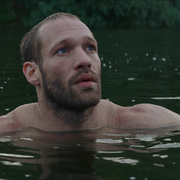At The Crossroads: Slovenian Cinema
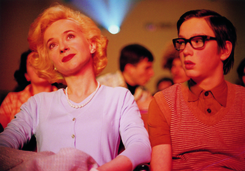
At The Crossroads: Slovenian Cinema
December 5-14, 2008
Surrounded by powerful neighbors, with a population of barely two million and a language spoken only by its inhabitants, Slovenia has struggled for centuries to keep its own identity and culture. It was part of the Austro-Hungarian Empire from the 14th century to the end of World War I, when it was included in the newly founded “Kingdom of the Serbs, Croats and Slovenes,” a political unit created at the Versailles Peace Conference that was later renamed Yugoslavia. During World War II, Slovenia was invaded and partitioned among Austria, Hungary and Italy. Afterwards, it was incorporated into Tito’s Socialist Federal Republic of Yugoslavia, where it became the country’s most prosperous and developed region. On June 25, 1991, the Republic of Slovenia declared its independence.
With this turbulent history, it’s remarkable that Slovenia has maintained a national cinema at all. Yet film, which first appeared in the capital Ljubljana as early as 1896, thrived within the socialist republic. Triglav Films, Slovenia’s first major film studio, was founded in 1947, and within a few years was producing popular domestic comedies such as Vesna. Many of the new currents in 1960s European cinema arrived early in Slovenia, and works such as Dance in the Rain and Paper Planes helped introduce a modernist sensibility into Yugoslav cinema. Following independence, many feared that an audience as small as Slovenia’s could not sustain a national cinema. Despite rough years, critical and commercial successes including Sweet Dreams have shown the viability of the country’s filmmaking.
Slovenian films, currently averaging about six to eight a year, have also become an increasingly familiar presence at international film festivals. The Slovenian Film Fund has been essential in fostering this remarkable growth. Founded in 1994, the SFF has supported over twenty directorial debuts, helping create a new generation of filmmakers. It has also promoted Slovenian film more actively internationally and encouraged co-production arrangements with other members of the European community. As a result, at a time in which most discussions of international cinema focus on the negative impact of globalization, Slovenia has become an uplifting and inspiring success story for the cinemas of other small nations.
Our first presentation of the Slovenian films took place in 2004, but featured only recent works. This year's series will be the first comprehensive overview of Slovenian cinema after WWII.
At The Crossroads: is presented by the Northwest Film Forum in collaboration and with major support from the Slovenian Film Fund. The series was programmed by Richard Peña and organized by Irena Kovarova, independent film programmer. Additional support provided by The Consulate General of Slovenia. Special thanks to Consul General Alenka Suhadolnik and Nerina T. Kocjancic, Head of Promotion, Slovenian Film Fund.
Sponsored by UW Slavic Languages and Literatures

Vesna
Dec 05, 2008
(Frantisek Cáp, Yugoslavia, 1953, 35mm, 93 min)
One of the best loved of all Slovenian films—the national film award is actually called the Vesna in the film’s honor—this surprisingly gentle college comedy was a huge hit that helped put Slovenia’s newly founded film studio Triglav Film on the cinematic map.
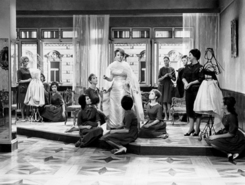
Dance In The Rain
Dec 06, 2008
(Bostjan Hladnik, Yugoslavia, 1961, 35mm, 100 min)
With its frequent shifts of point of view and jumbled time frame, Dance in the Rain (Ples v dezju) was one of the first films to introduce to Yugoslavia the new, modernist approaches to cinematic storytelling that were then emerging across Europe.
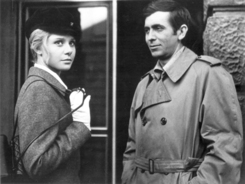
Paper Planes
Dec 07, 2008
(Matjaz Klopcic, Yugoslavia, 1967, 35mm, 80 min)
Beautifully acted by its two leads, Paper Planes (Na papirnatih avionih) is a delicate, quietly observed meditation on modern relationships that became an instant classic with both critics and audiences.
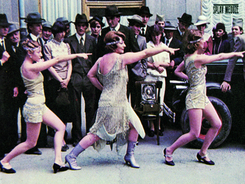
Raft Of The Medusa
Dec 12, 2008
(Karpo Acimovic-Godina, Yugoslavia, 1980, 35mm, 101min)
Karpo Godina, one of Yugoslavia’s most talented cinematographers, moved to directing with this wry look at the arrival of the aesthetic revolution in the just-founded “Kingdom of the Serbs, Croats and Slovenes”—soon to be known as Yugoslavia.
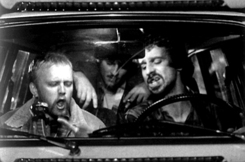
Idle Running
Dec 13, 2008
(Janez Burger, Slovenia, 1999, 35mm, 90 min)
Taking a page from the Jim Jarmusch notebook, first-time director Janez Burger elicits winning performances from his young cast and resourcefully fashions a quirky and mature low-budget movie about the consequences of avoiding life.

Sweet Dreams
Dec 14, 2008
(Saso Podgorsek, Slovenia, 2001, 35mm, 110 min)
A rich, revealing chronicle of an era, Saso Podgorsek's second film charts Egon’s attempt to find his own way among his family, hippies, schoolmates, teachers, Communists and dissidents.


